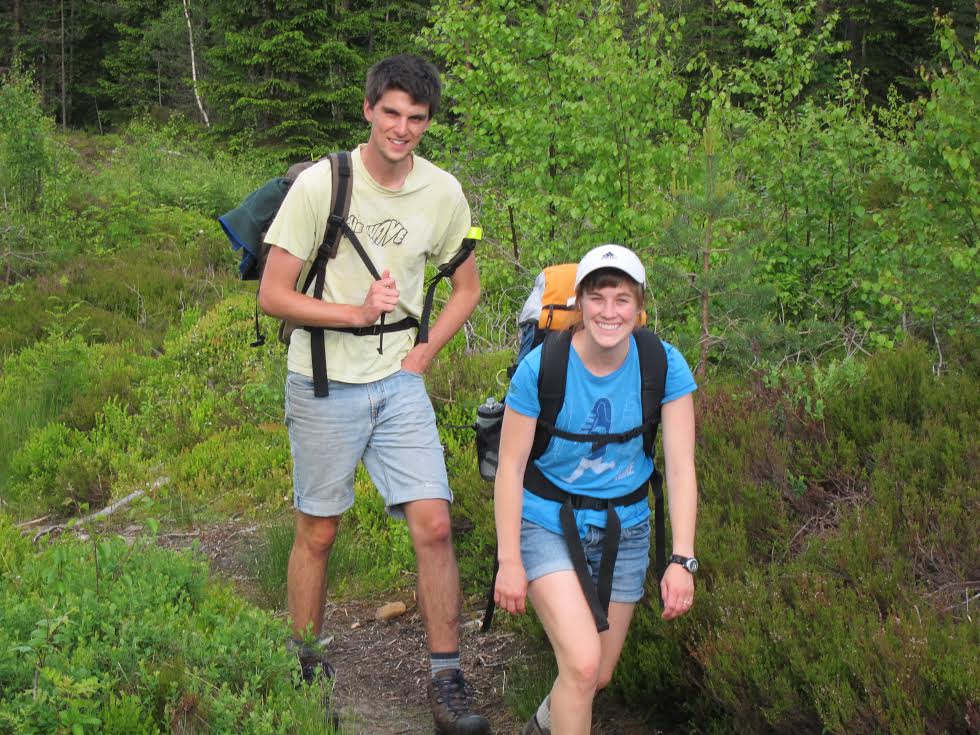Josh Cranston '12 on Sustainable Habits, Christian Ritual, and Creation Care
Published: April 13, 2021
A prestigiousFulbright Scholarship offered Josh Cranston '12the opportunity to spend the 2012-2013 academic year researching environmental sustainability at the University of Oslo in Norway.He attended classestoward a masters degree inculture, environment and sustainabilityat the Centre for Development and Environment. Though Cranston anticipated researching grey ecology and urban sustainability, his studies took a surprising theological turn. As he thought about ways of encouraging people to adopt more sustainable behaviors, he realized that more information isn't necessarily the answer. Instead, he considered the role habit plays in shaping behavior. Cranston believes we need to rehabituate ourselves to more sustainable behaviors, and that Christian rituals can shape how we relate to the Earth.
Cranston continues to work on his master's thesis through the University of Oslo in Norway remotely and anticipates completing it this year. He lives with his wife, Rachel (Zahniser '12) Zahniser-Cranston, in Wichita, Kansas, where he also works part-time as a gardener with a youth gardening program for at-risk teens.
He recently shared with us the thoughts behind his master's thesis (below).
A STIFF-NECKED PEOPLE
"Despite all the information available to the public about the imminent dangers of climate change and the persistent efforts of environmental advocates, people have not changed their behavior and adopted more sustainable lifestyles. In short, though the problem looms large and people know about it, the Western world still largely operates as if it is business-as-usual."
MORE INFORMATION vs. CHARACTER FORMATION
"I contend that the problem is not so much a dearth of information, but an inadequate character formation, or in other words, we have certain habits of consumption, heating, cooling, etc. that the imposition of more intellectual knowledge cannot easily overcome. To have a habit is to have a different kind of knowledge, a knowledge seated in the body (rather than the mind) that is direct, immediate, and not necessarily cognitive."
NEEDED: PRACTICE (REPETITION) OF BEHAVIORS THAT FOSTER CHARACTER
"To counter the problem of unsustainable habits, therefore, requires much more than the mental gymnastics proposed by most environmental advocates; instead, it calls for new social practices that incorporate the body in different movements and rhythms and cultivate by means of repetition the kinds of virtuous dispositions (i.e. temperance, patience, justice) that can respond constructively to the problem of climate change."
THE CHRISTIAN CHURCH - ALREADY EQUIPPED TO NURTURE THIS VIRTUOUS CHARACTER
"I also contend that the Christian church has the resources internal in its tradition to inculcate and sustain this kind of character of environmental virtue precisely because the church life integrally involves certain rituals, like baptism and Eucharist among others, that constitute particularly potent social practices. The space of Christian worship is a powerfully formative place, a liminal space where the church learns what it means to be the church, i.e. Christ's body, by practicing being the body of Christ."
TWO TOOLS ALREADY IN PLACE
"In particular, I believe that the practice of Eucharist has great import for Christianity and the environment, because it teaches the church in a very tangible manner that to be Christ's body requires attending to the lives and needs of others. In short, Eucharistic practice requires and creates church unity, and in this church unity the people of God learn that their actions and interactions have implications that multiply beyond the purview of the single individual.
This, in effect, is an ecological maxim: "You can never just do one thing" and the church stands well poised to appreciate and act on this environmental insight given that it learns just that every week at the communion table. Baptism too is riddled with environmental symbolism, for like the Eucharist it concerns the unity of the body, but achieves this in a ceremony that instructs us in the natural rhythms of life, death and rebirth. Christianity, thus, has some of the practical tools necessary to reform our environmentally destructive habits by reforming us into people of Christian (and by logical extension) virtue."
JOSH'S GUIDE ON THIS EXPLORATION OF SHAPING BEHAVIOR: ARISTOTLE
"I approach this topic through the lens of Aristotle and his philosophy of action in particular to better understand the original question of why people have not changed their behavior according to their knowledge. I also am indebted to the work of James K.A. Smith for his work on Christian education and Maurice Merleau-Ponty for his philosophy of perception that so prizes the primacy of the body."
AN EXAMPLE: THE ENVIRONMENTAL IMPLICATIONS OF THE EUCHARIST
"I can see two immediate environmentally relevant implications from the ritual of the Eucharist, beyond the significant fact that we celebrate each week with grains of the earth and fruits of the vine. First, learning to be a member in a body larger than one's self is exactly the kind of habit we need to combat climate change because behaving sustainably at base means thinking and acting altruistically, that is with others in mind. Second, in the Eucharist, we learn that we are what we eat; we become part of the Body of Christ just as we consume the Body of Christ. More precisely, what we eat incorporates us into it. Consumption entails formation, or incorporation. This Eucharistic logic, when applied to today's food culture reveals grotesque results: America's food, even a lot of the "organic" food, is the result of monocultural production techniques and mass industrial farming reliant on fossil fuels."
This article originally appeared as a Web Extra in the Spring 2014 edition of The RECORD.
